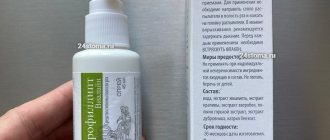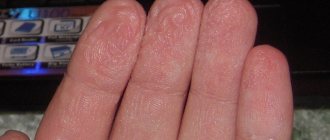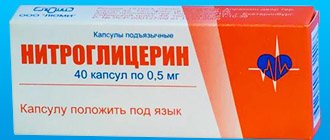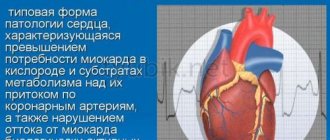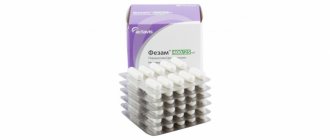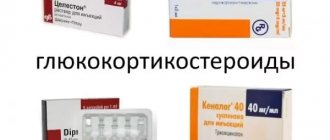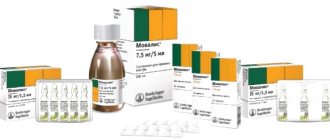Compound
The composition of Nurofen depends on the form of its release:
| Dosage form | Active ingredient: Nurofen | Auxiliary Connections |
| Capsules | Ibuprofen 200 mg | Macrogol-600, potassium hydroxide, water. shell: gelatin, sorbitol 76% solution, crimson dye [Ponceau 4r] (e124), water, white ink [opacode wb ns-78-18011]. |
| Pills | Ibuprofen 200 mg | Croscarmellose sodium, sodium lauryl sulfate, sodium citrate dihydrate, stearic acid, colloidal silicon dioxide. shell: carmellose sodium, talc, acacia gum, sucrose, titanium dioxide, macrogol 6000, black ink [opacode s-1-277001]. |
| Suspension for children | Ibuprofen 100 mg/5 ml | Polysorbate, glycerol, maltitol syrup, sodium saccharinate, citric acid, sodium citrate, xanthan gum, sodium chloride, domiphene bromide, orange flavor 2m16014 or strawberry flavor 500244e, purified water. |
| Express gel | Ibuprofen 5 g/100 g | Hyethylose, sodium hydroxide, benzyl alcohol, isopropanol, purified water. |
| Suppositories for children | Ibuprofen 60 mg | Solid fat 1 (vitepsol n 15), solid fat 2 (vitepsol w 45). |
Components and release form
The drug is produced in 2 forms: gel and tablets. The tablets are coated with a light film and have a round shape. Sold in packages.
Nurofen in gel form is intended for external use. It has a colorless and homogeneous consistency with an inherent odor of alcohol.
The main component is ibuprofen. The tablets contain auxiliary elements: croscarmellose sodium, colloidal silicon dioxide, stearic acid.
Additional components in the gel are: sodium hydroxide, isopropyl alcohol, water.
pharmachologic effect
NSAIDs. Has analgesic properties. Relieves fever. Blocks the spread of inflammatory processes.
Pharmacodynamics
The mechanism of action of the drug is explained by the properties of a propionic acid derivative and is caused by inhibition of the synthesis of PG - mediators of pain, inflammation and hyperthermic reaction. Indiscriminately stops the work of COX of the first and second types. Slows down the production of prostaglandins.
Reversibly inhibits platelet aggregation. The analgesic effect lasts for up to eight hours.
Pharmacokinetics
Has high absorption. Almost completely absorbed from the gastrointestinal tract. The maximum concentration in blood plasma when taken orally on an empty stomach is recorded after 45 minutes. If you take the tablets with food, the Cmax time approximately doubles.
90% bound to blood proteins. Gradually penetrates into the joint cavities. Retains in synovial fluid. Lower concentrations of ibuprofen are found in cerebrospinal fluid than in plasma. Passes into breast milk in small quantities.
Metabolized in the liver. It is excreted from the body by the urinary system, a small part - with bile. The half-life is two hours.
Indications for use
Indications for use of Nurofen:
- headache, migraine;
- toothache;
- neuralgia;
- myalgia;
- pain in the back;
- rheumatism;
- algodismenorrhea;
- joint pain;
- osteoporosis;
- rheumatoid arthritis;
- pain resulting from any injury.
Nurofen is often used for colds. It relieves inflammation and lowers body temperature, improving the general well-being of the patient.
Nurofen for influenza should be taken only to combat fever - the drug does not have antiviral activity and cannot speed up recovery.
Nurofen at temperature
Can be used if body temperature is more than 38.5°C. If fever persists after three days of anti-inflammatory treatment, you should definitely consult your doctor.
Nurofen for headaches
Relieves the pain of tension. Has a high safety profile. Eliminates symptoms for up to 8 hours. At the same time, it eliminates inflammation.
Nurofen for toothache
The drug is effective for pulpitis, relieves pain during the recovery period after surgical treatment. The medicine can be given to children in the form approved for them during the eruption of baby teeth.
Nurofen for menstruation
Very quickly and effectively eliminates painful cramps, improves a woman’s well-being during menstruation. Depending on how you feel, you can use up to 3-4 tablets per day.
Nurofen for chickenpox
Used only to normalize body temperature. It does not speed up the healing process, since it does not affect viruses and does not destroy the smallpox pathogen.
It can cause purulent complications, so it is not recommended for this diagnosis.
Nurofen for migraines
Eliminates severe headaches, fights intolerance to sounds and bright light. Can be used at the prodrome stage, as well as directly during an attack.
What is Nurofen syrup and tablets for?
The action of Nerofen is explained by the presence of ibuprofen in the composition, which, by acting on the thermostat in the brain, relieves fever and returns the temperature to normal values.
In addition, ibuprofen inhibits the synthesis of prostaglandins, which are mediators of pain. Which explains its analgesic effect. This is why Nurofen is indicated for:
- high body temperature;
- toothache;
- headache;
- muscle pain;
- for adverse reactions after DTP.
Contraindications
Contraindications to the use of Nurofen are as follows:
- complete/incomplete combination of bronchial asthma, recurrent polyposis of the nose and paranasal sinuses and intolerance to Aspirin or other NSAIDs;
- allergy to Nurofen;
- erosion/ulcer of the gastrointestinal tract, bleeding of ulcerative origin;
- history of perforation and bleeding of a gastrointestinal ulcer caused by the use of any non-steroidal anti-inflammatory drug;
- severe liver/renal failure;
- acute liver diseases;
- hyperkalemia;
- severe disturbances in the functioning of the cardiovascular system (NYHA class four);
- recovery after coronary artery bypass surgery;
- bleeding of any origin;
- decompensated heart failure;
- hemorrhagic diathesis;
- third trimester of pregnancy;
- individual fructose intolerance, sucrase-isomaltase deficiency, glucose-galactose malabsorption;
- hemophilia, blood clotting disorder.
Particular caution should be exercised when treating with Nurofen in patients with a history of gastritis, colitis, enterocolitis, bronchial asthma, allergies, lupus erythematosus, and Sharpe's syndrome. Also, patients with severe dehydration and nephrotic syndrome should be treated under the supervision of a doctor.
Dosage
The dosage of Nurofen for adults and children over 12 years of age is 1 capsule or tablet (200 mg) up to 3-4 times a day. The interval between doses should be about six hours. The maximum permissible daily dosage is 1200 mg.
The dosage of Nurofen for children depends on age and body weight. It should not exceed more than 30 mg/kg:
- 3-6 months (5-7.6 kg) - 2.5 ml three times a day;
- 6-12 months (7.7-9 kg) - 2.5 ml up to 4 times a day;
- from one to three years (10-16 kg) - 5 ml 3 times;
- from 4 to 6 years (17-20 kg) - 7.5 ml three times a day;
- from 7 to 9 years (21-30 kg) - 10 ml in the morning, lunch and evening;
- from 10 to 12 years (31-40 kg) - 15 ml three times.
Treatment of a child with Nurofen should last no more than three days.
The dosages of children's suppositories are as follows:
- age from 3 to 9 months - 1 piece three times a day;
- from 9 months to 2 years - 1 piece 4 times.
The gel is intended for patients over 14 years of age. You need to squeeze out a strip 4 to 10 cm long from the tube and gently rub it into the painful area. Reuse is possible after 4 hours.
How many times can Nurofen be given to a baby?
The effect of the drug begins an hour after the first dose. The decrease in temperature can continue for up to half an hour until the values drop to normal levels. The antipyretic effect can last up to 8 hours. However, with severe inflammatory processes, the fever may return after 4-5 hours. An infant can be re-given a single dose of the drug both in the form of suppositories and in the form of syrup after 4 hours if the temperature begins to rise again. A baby can receive up to 5 permissible single doses per day.
Side effects
To avoid unwanted side reactions, it is necessary to take the medicine in small doses over a short course. In elderly people, the likelihood of complications caused by taking Nurofen is higher.
When using the product, adverse reactions may occur:
- Disorders of the hematopoietic system, including agranulocytosis, thrombocytopenia, pancytopenia. With these diagnoses, first the patient’s body temperature rises and his throat begins to hurt. Later, mild nosebleeds occur. Numerous skin hemorrhages appear.
- Allergic and anaphylactic reaction, spasm of the respiratory tract. Shortness of breath, bronchospasm, and exacerbation of bronchial asthma may occur. Also, individual intolerance to Nurofen is manifested by urticaria, Lyell's syndrome, Stevens-Johnson syndrome, erythema, rhinitis, and edema.
- Abdominal pain, nausea, vomiting, flatulence, constipation. Rarely, gastrointestinal bleeding, melena, gastritis, exacerbation of colitis or Crohn's disease occur.
- Problems with the liver. Increased activity of liver transaminases, jaundice, hepatitis.
- Acute renal failure - with long-term use. Nephrotic syndrome, cystitis, hematuria, proteinuria, papillary necrosis.
- Headache. Aseptic meningitis.
- Blood pressure surges. Heart failure. There may be an increased risk of blood clots.
- Shortness of breath, difficulty breathing.
Changes in laboratory parameters may occur due to the use of Nurofen. Thus, the level of hemoglobin and hematocrit, glucose concentration may decrease, and blood clotting may decrease.
Plasma concentration of creatinine, on the contrary, increases, as does the activity of liver transaminases.
If the patient experiences any side effects, he needs to interrupt the anti-inflammatory drug course and seek medical advice again. The doctor will conduct the necessary examination and select the optimal Nurofen analogue.
special instructions
The manufacturer recommends taking Nurofen in the shortest possible courses in the minimum effective dosages. This reduces the likelihood of developing adverse reactions. If you need to take the drug for more than ten days, then this should be done strictly under medical supervision.
Persons with bronchial asthma or prone to allergies should be warned that Nurofen may cause bronchospasm.
The use of the drug for lupus erythematosus and mixed connective tissue pathologies can cause the occurrence of aseptic meningitis.
If a long-term drug course is planned, the peripheral blood picture should be constantly examined. It is also necessary to monitor changes in the activity of the kidneys and liver.
If you need to evaluate the level of 17-ketosteroids, stop taking Nurofen 2 days before the examination.
Not compatible with ethanol.
If signs of gastropathy appear, a diagnostic study is necessary, including esophagogastroduodenoscopy, stool analysis for the presence of occult blood, and collection of a urine sample.
Persons diagnosed with renal failure should consult a doctor before starting treatment with Nurofen.
In case of arterial hypertension (including a history of it), heart failure, the drug should be used with caution and only as prescribed by a doctor. The drug can cause fluid retention, which will lead to a hypertensive crisis and the formation of serious edema.
In case of untreatable and uncontrolled hypertension, coronary heart disease, pathologies of peripheral arteries, cerebrovascular anomalies, congestive heart failure of class II or III according to NYHA, you should stop taking ibuprofen in high dosages.
Treatment with Nurofen for chickenpox is associated with an increased risk of dangerous purulent complications of existing infectious and inflammatory lesions of the subcutaneous fat.
Suppresses the production of cyclooxygenase and the synthesis of prostaglandins. Negatively affects the ovulation process. To some extent suppresses the reproductive abilities of the body. These effects are reversible after discontinuation of treatment. Patients planning pregnancy should take this into account.
May cause dizziness, lethargy, drowsiness, and worsen attention characteristics. Therefore, persons who drive a car or operate potentially dangerous machinery must be especially careful. During the drug course they should avoid driving a vehicle.
Use during pregnancy and breastfeeding
It is forbidden to use in the third trimester. If possible, treatment with Nurofen should be avoided in the first and second trimester.
Small amounts of ibuprofen are excreted in breast milk. But this in no way affects the baby’s health. For this reason, it is not necessary to stop breastfeeding during treatment with the medication.
Use in childhood
Cannot be used by patients under six years of age. Use with caution when treating children under 12 years of age.
For impaired renal function
Contraindicated for use in severe renal failure if creatinine clearance is less than 30 ml/min.
It can be taken with caution if this indicator varies from 30 to 60 ml/min., as well as with nephrotic diseases.
For liver dysfunction
Not suitable for patients with severe liver failure or acute liver diseases.
Under medical supervision, it can be used by persons with cirrhosis with portal hypertension, hyperbilirubinemia.
Use in old age
Can be prescribed to elderly people, but with caution.
Nurofen's analogs
Among the most popular analogues of Nurofen are: Ibuprofen, MIG 400, Faspik, Maximcold.
The gel form can be replaced with Ibuprofen ointment, Dolgit gel and Dolgit cream.
Which is better Nurofen or Ibuprofen?
Both drugs contain the same active ingredient, therefore they have the same indications and contraindications. But, according to patient reviews, Ibuprofen more often causes unwanted side reactions.
Which is better Nurofen or Paracetamol?
Paracetamol begins to act more slowly, which is why the patient is forced to endure the pain longer. It also lowers body temperature worse and for a shorter period of time in viral and infectious diseases.
Paracetamol does not have anti-inflammatory properties like Nurofen. But it is safer for pregnant women.
At the same time, during treatment with Ibuprofen, adverse reactions occur more often, and there is a possibility of bleeding. It should not be used for a long time, as the risk of damage to the mucous membranes of the stomach increases.
Which is better Nurofen or Panadol?
Panadol is based on paracetamol, Nurofen is based on ibuprofen. Both drugs relieve pain and reduce body temperature. They qualitatively eliminate the signs of acute respiratory viral infections, headaches, toothache and muscle pain. They do not accumulate in the human body and do not form toxic compounds.
Panadol lowers body temperature more slowly. It is safer for children and pregnant women. If necessary, drugs can be combined or alternated.
Which is better Nurofen or Cefekon?
Cefekon is a medicine based on paracetamol. Its effect lasts for up to 4 hours. Nurofen acts longer (up to 6-8 hours) and much faster. This is its significant advantage. It also relieves toothache better.
Which is better Nurofen or Ibuklin?
Ibuklin is a combination drug. It contains both ibuprofen and paracetamol. Very quickly lowers body temperature to normal levels. It is stronger than Nurofen. At the same time, it is characterized by a stronger load on the liver and irritates the mucous membranes of the gastrointestinal tract. It can only be purchased with a doctor's prescription.
The use of Ibuklin is relevant if the body temperature exceeds 39 ° C. It is advisable to use it once.
Which is better Nurofen or Nise?
Nise is recognized as a more progressive anti-inflammatory. It is based on nimesulide. This substance quickly relieves muscle pain, has antipyretic properties, and does not cause stomach ulcers. But it is contraindicated in patients under 16 years of age. Long-term use may cause toxic liver damage.
Nise has more pronounced toxic properties than Nurofen. But with short-term use, they most often do not appear.
If Nurofen does not bring down the temperature: what to do
When the thermometer rises above 39˚C, absorption of substances from the stomach may stop. This means that taking medications orally may not have an effect. This happens especially often when the patient washes down the tablet or syrup with cold water. Once in the stomach, cold liquid forces the vessels of the gastric walls to contract, as a result of which they cannot fully pass substances through their walls.
In this case, doctors recommend giving preference to rectal suppositories at high temperatures exceeding 39˚C. The suppository, once in the rectum, quickly dissolves, and ibuprofen immediately enters the bloodstream through the intestinal walls. After 30-40 minutes, the patient’s temperature begins to decrease.
